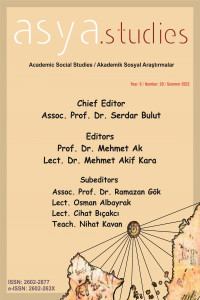DİSTOPİK FİLMLERDE KADININ TEMSİLİ: BİR ADEM HAVVA HİKAYESİ
Çoğunlukla “ütopya” kavramının anti-tezi olarak tanımlanan “distopya”, geçmiş ve şimdiden yola çıkarak, geleceğin toplum yapısına dair olumsuz öngörülerde bulunan düşünsel içerikleri anlatmakta kullanılan bir kavramdır. Distopya kavramının tarihsel kökleri daha eskilere uzansa da, hayal edilebilecek en kötü yönetim ve durumları ifade etmek için ilk olarak kullanan kişi John Stuart Milldir. Kavramsal bağlamın ötesinde bir edebiyat türü olarak ortaya çıkması ise 20. yüzyılın başlarında olmuş, 1920’lerin sonlarına doğru ise sinema sanatı içerisinde kullanılmaya başlanmıştır. Genel olarak bilimkurgu türü içerisinde ele alınabilecek distopik filmler kültürel, politik, tarihsel gelişmelere göre farklılık göstermiştir. Bu yazıda klasik denebilecek, iktidarı, ekonomik sistemi ve bilimsel, Aydınlanmacı aklın bir eleştirisi olan beş film, Metropolis (1927, Fritz Lang), Fahrenheit (1966, François Truffaut), 1984 (1984, Michael Radford), Brazil ( 1985, Terry Gilliam), Equilibrium (2002, Kurt Wimmer) ele alınmaktadır. Bu filmlerdeki ortak tema, ilerlemeci, modernist, bilimci bakış açısını arkasına alarak genişleyen, genişledikçe eşitsizlikleri, baskıyı artıran bir ekonomik düzen ve bu düzeni ayakta tutmaya çalışan hantal, toplumu duygulardan arınmış aklın buyrukları doğrultusunda dizayn eden, sistemini sürdürmek için teknolojinin imkanlarıyla gözetleyen, insan doğasını dışlayan, dışladıkça da gelişen tepkilere karşılık zalimleşen bürokratik yapı ve bu bürokratik yapının nesneleşmiş hali olan memurlar konu edinilir. Bu filmlerde memurlar erkekle temsil edilmekte, bürokrasi, iktidar, üst düzey görevler tamamen erkeklerin elindedir. Sistem eril olduğu kadar kendini sürdürmek için de eril bakış açısına ihtiyaç duyar.
The concept of dystopia that is mostly defined as an anti-thesis of the concept of utopia, is a concept that is used to tell intellectual contents that makes negative predictions about the structure of society of the future on the basis of past and now. Even if historical bases of the concept of dystopia reaches out the worst management and states imaginable. While It was in the early part of twentieth century that beyond the conceptual context It emerges as a literary genre, It has been used in the films toward the end of 1920s. Dystopian films that generally can be considered in type of the science fiction genre differs according to cultural, political and historical developments. , Metropolis (1927, Fritz Lang), Fahrenheit (1966, François Truffaut), 1984 (1984, Michael Radford), Brazil ( 1985, Terry Gilliam), Equilibrium (2002, Kurt Wimmer) that can be called classical , are criticism of enlightened, scientific mind, economical system and the government and these five films are addressed in this article. The common theme in these films are expanding economic system by progressive, modernist and scientific perspective, the bureaucratic structure that is tries to sustain for this system by using opportunities of technology and the officers that are figüre of this bureaucratic structure. The officers are represented by man in these films, bureaucracy, the government, high level tasks are in men’s power. The system is both masculine and needs masculine perspective to maintain his own life. Heroines have two represantations in the sense of gender and social role; on the one hand woman that is enchained directly by the system, is benumed, objectified, is part of the consumption culture on the other hand woman who is purified from emotions, can revolt and look critically sometimes with her emotions, sometimes her wisdom ar this repressive, authoritarian and absurd system.Because woman is an emotion that generally does not submit to this system that is purified from human being, insentive and mind is brought to the foreground. Woman nature, is the represantation of the nature which is lost by men. Hero is a person who works in the high-level task in bureaucracy, mostly protect his docility even if he is compatible or not compatible with the system. Woman who comes into man’s life, will damage harmony of the system, will create the state which will provide to look critically through woman, woman is not visible in these films. Thus man takes the place of woman on the stage. Even if the figüre of woman stands in somewhere, she is not in an important position into the fiction of film anymore. Political and reactional act that will demolish the system, is made by man.
___
- Arslantepe, Mehmet (2010). Sinemada Feminist Teori, 3. Uluslararası Bir Bilim Kategorisi Olarak Kadın: Edebiyat, Dil, Kültür ve Sanat Çalışmalarında Kadın Sempozyumu.
Bayhan, Vehbi(2012). Beden Sosyolojisi Ve Toplumsal Cinsiyet, Doğu Batı Dergisi, 16/63, 153-157.
Çelik, Ejder (2015). Distopik Romanlarda Toplumsal Kurgu, Sosyoloji Araştırmaları Dergisi, 18/1, 57-79.
De Beauvoir, Simon (1981). Kadın Bağımsızlığa Doğru, (çev. Bertan Onaran), İstanbul: Panel Yayınevi.
Derman, D. (1994). Jean-luc Godard’ın Sinemasında Kadının Yeniden Sunumu, Ankara: Değişim Ajans.
Firestone, Shulamith (1993). Cinselliğin Diyalektiği, (çev. Yurdanur Salman), İstanbul: Panel Yayınevi.
Giddens, Anthony (2004). Modernliğin Sonuçları, (çev. Ersin Kuşdil), İstanbul: Ayrıntı Yayınları.
Işık, E. (1998). Beden ve Toplum Kuramı, İstanbul: Bağlam Yayıncılık.
Irigaray, Luce (2006). Ben Sen Biz, (çev. Sabri Büyükdüvenci & Nilgün Tutal), İstanbul: İmge Yayınevi.
İnceoğlu, Yasemin & Kar, Altan ( 2010). Kadın ve Bedeni, İstanbul: Ayrıntı Yayınları.
Kaplan, Neşe & Terek Ünal, Gülin (2011). Bilim Kurgu Sinemasını Okumak, İstanbul: Derin Yayınları.
Rigel, Nurdoğan, vd.,(2005). Kadife Karanlık, İstanbul: Su Yayınevi.
Simelik, Anneke (2008). Feminist Sinema ve Film Teorisi ve Ayna Çatladı, (çev. Deniz Koç), İstanbul: Agora Kitaplığı.
Taş, Gün (2016). Feminizm Üzerine Genel Bir Değerlendirme: Kavramsal Analizi, Tarihsel Süreçleri Ve Dönüşümleri, Akademik Hassasiyetler Dergisi, 3/5, 167-169.
Taylor, Charles (1995). Modernliğin Sıkıntıları, (çev. Uğur Canbilen), İstanbul: Ayrıntı Yayınları.
Tuchman, Gaye (1978). Hearth and Home, İmages of Women and The Media, New York: Oxford Universty Press.
Weber, Max (2008). Bürokrasi ve Otorite, (çev. H. Bahadır Akın), Ankara: Adres Yayınları.
Weber, Max (1997). Protestan Ahlakı ve Kapitalizmin Ruhu, (çev. Zeynep Aruoba), İstanbul: Hil Yayın.
